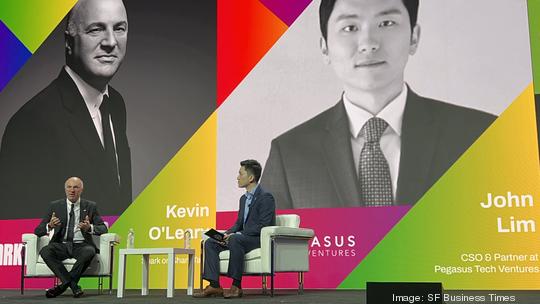
If you ever pitch Kevin O'Leary on ABC's reality TV show “Shark Tank,” you better know your numbers and have a great customer acquisition pipeline.
O'Leary has been a so-called "shark" on the show since its premier in 2009, and he had lots of advice for entrepreneurs during the Startup World Cup on Friday.
The competition, organized by Pegasus Tech Ventures, a San Jose-based venture firm, awards a $1 million investment to one startup during its Grand Finale after holding regional events around the world throughout the year.
This was the Startup World Cup's first competition since 2019, after putting the event on hold for two years due to the pandemic.
Pegasus partner John Lim interviewed O'Leary on stage during the day-long event at the Marriott Marquis hotel in San Francisco.
"I'm very interested in Web3. I want to spend a lot of money very quickly," O'Leary said, after announcing that he became a UAE citizen last year. "My job is to help deploy capital from there. We have a new fund called Cipher. It's Web3 only. Our largest investors are from the United Arab Emirates, and I'm the chairman of it. I am looking for Web3 deals. Not Web2 being converted to Web3. I mean, nascent Web3 ideas. I have a quarter of a million dollars to start with. I'm ready to fund. I'm looking for deals…. Send me your decks, we're open for business."
Watch the full video below. Here are six more things O'Leary wants all founders to know:
What makes a winning pitch on “Shark Tank”?
“There's three attributes… No. 1, can you articulate the opportunity in 90 seconds or less? The whole idea of presenting an opportunity is to define it very quickly. What is it that you have that could be such a great opportunity, and what ideas? … Most of the great pitches, you can explain the 30 seconds.
“No. 2: Great ideas are a dime a dozen. What's really rare are executional skills. So now you have the ear of the investor. You could be in a VC pitch, you could be in an elevator, you could be on the “Shark Tank” carpet, whatever. OK, I like the idea. Why can you make it happen? What is it about you and your team that can execute on this? Do you know the sector? Have you done this before, have you worked for a competitor, have you failed three times and figured out the mistakes you made? I personally would rather invest in an entrepreneur that's failed and felt the sting of failure and is highly motivated to get out there and fix what they did wrong because they've learned from it, but that doesn't matter. What matters is to tie your executional skills to the idea so that all of a sudden you're mitigating risks for the investor.
“But there’s one more, and this one’s the killer. I've seen this happen so many times… You have to know your numbers. How big is the market? How fast is it growing? What's the gross margins? What's the break even analysis? How many competitors do you have? You have to have those right on the tip of your tongue, because that is the glue that binds. If you get onto the Shark Tank carpet, and you've got everybody interested in your deal, and you don't know your numbers? You deserve to burn in hell in perpetuity. And I will personally put you there.”
What makes a good pitch deck?
“You have to have a clean deck. And let me give you a little information about the deck. Never make it more than 12 pages. Never. Nobody reads more than 12 pages… When I get a deck of 38 slides, right into the garbage. That means you don't know what you're doing. You don't know how to pitch or you're already a loser. And so, not interested. It has to be really, really tight. And then in due diligence, the backup data. Or have a data room online that analysts can go look at. But when you’re pitching the principal of a VC firm, don’t do a 38-page deck… You’ll never get funding.”
Crowdfunding can complement venture funding.
“With equity crowdfunding go to your customer base, they become shareholders, they don't have the time limit. So they're straight common. There's no preference. They're your advocates already. They're your customers. And they tend to stay loyal for a really, really long time… The VCs are starting to understand the value of doing that, because in the end, the only thing that the investor cares about in today's market is one metric: customer acquisition costs. If you don't know what that is, and you don't know how to manage it, you will never get funded.”
The right mix of direct-to-consumer sales.
“Ideal companies, for me, are ones that have 25% of revenue direct-to-consumer on their own platform where they're gathering consumer data… or B2B which is the same thing, (and) 25%, if it’s consumer goods, on Amazon… And then if you're successful in understanding how to do retail, 50% of retail, but your margins there, you're going to have to pay 30 to 40% margins to the retailer. So, that's a successful company managing all the distribution channels. And the reason you would even do retail is to just keep the knockoffs away from shelf.”
How many killer deals do the sharks tend to make?
“Typically on “Shark Tank,” you're doing 17 deals a year, 17 to 20, and closing on 12 to 15 after diligence. And every time I make the assumption that that was gonna be my hot one for the year. And generally in VC since at least the ’50s when it started in Boston, the model looks like this: You do 10 deals, get two monster wins, just homeruns within seven years. You basically get a middle bar full of zombie companies that just struggle and don't do anything. And you get two pieces of crap that die right away. So you think about that six zombies, two dogs, two monster winners that pay for all your mistakes.
“‘Shark Tank”’s a little different, because we can take a mediocre operating company and get its customer acquisition cost to zero. Because you know, maybe you get 3 or 4 or 5 million people seeing the live episode, but you get 100 million more eyeballs on syndication. So that you're constantly out there with free customer acquisition, and the Shark Tank companies over the decades have really figured out how to do this. You need to get a deal so that you can get the updates, so that the companies get updated, and every shark has an equal number of updates. And so you're reminding them of that. And that goes into syndication, too. So, everybody knows how to play that game. And it's a remarkable platform. So instead of, you know, only two hits, generally sharks get four monsters out of 10.”
How long should it take a business to break even?
“Most companies lose money for the first two years. And then if you can't figure out a way to profit, in the third, your funding starts to dry up. And so I always call it after three years just a hobby, it never was a business, and you should take it out behind the barn and shoot it because you're wasting your time, and you should do something else. But once you get to a break even, you can start to tweak to get to positive cash flow.”








